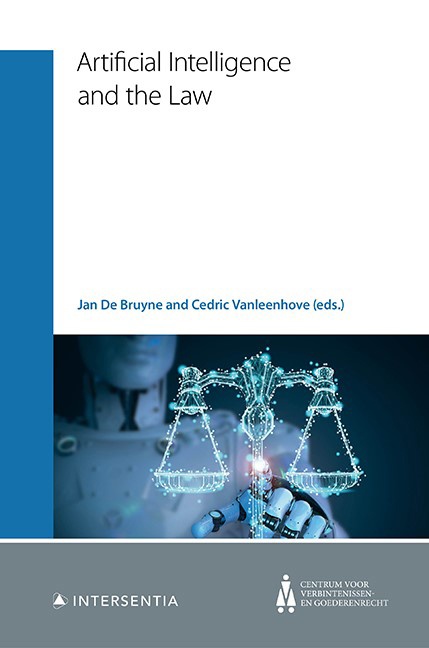Book contents
- Frontmatter
- Contents
- Foreword
- Contributing Authors
- Chapter 1 Basic Concepts of AI for Legal Scholars
- Chapter 2 Different Models of Innovation and Their Relation to Law
- Chapter 3 Setting the Scene: On AI Ethics and Regulation
- Chapter 4 Quantitative Legal Prediction: the Future of Dispute Resolution?
- Chapter 5 AI Arbitrators … ‘Does Not Compute’
- Chapter 6 AI through a Human Rights Lens. The Role of Human Rights in Fulfilling AI’s Potential
- Chapter 7 Killer Robots: Lethal Autonomous Weapons and International Law
- Chapter 8 AI and Data Protection: the Case of Smart Home Assistants
- Chapter 9 AI and IP: a Tale of Two Acronyms
- Chapter 10 Tax and Robots
- Chapter 11 Robotisation and Labour Law. The Dark Factory: the Dark Side of Work?
- Chapter 12 The Hypothesis of Technological Unemployment Caused by AI-Driven Automation and its Impact on Social Security Law
- Chapter 13 AI in Belgian Contract Law: Disruptive Challenge or Business as Usual?
- Chapter 14 Tort Law and Damage Caused by AI Systems
- Chapter 15 Insurance Underwriting on the Basis of Telematics: Segmentation and Profiling
- Chapter 16 AI and Creditworthiness Assessments: the Tale of Credit Scoring and Consumer Protection. A Story with a Happy Ending?
- Chapter 17 AI and the Consumer
- Chapter 18 Robots and AI in the Healthcare Sector: Potential Existing Legal Safeguards Against a(n) (Un)justified Fear for ‘Dehumanisation’ of the Physician-Patient Relationship
Chapter 6 - AI through a Human Rights Lens. The Role of Human Rights in Fulfilling AI’s Potential
Published online by Cambridge University Press: 26 May 2021
- Frontmatter
- Contents
- Foreword
- Contributing Authors
- Chapter 1 Basic Concepts of AI for Legal Scholars
- Chapter 2 Different Models of Innovation and Their Relation to Law
- Chapter 3 Setting the Scene: On AI Ethics and Regulation
- Chapter 4 Quantitative Legal Prediction: the Future of Dispute Resolution?
- Chapter 5 AI Arbitrators … ‘Does Not Compute’
- Chapter 6 AI through a Human Rights Lens. The Role of Human Rights in Fulfilling AI’s Potential
- Chapter 7 Killer Robots: Lethal Autonomous Weapons and International Law
- Chapter 8 AI and Data Protection: the Case of Smart Home Assistants
- Chapter 9 AI and IP: a Tale of Two Acronyms
- Chapter 10 Tax and Robots
- Chapter 11 Robotisation and Labour Law. The Dark Factory: the Dark Side of Work?
- Chapter 12 The Hypothesis of Technological Unemployment Caused by AI-Driven Automation and its Impact on Social Security Law
- Chapter 13 AI in Belgian Contract Law: Disruptive Challenge or Business as Usual?
- Chapter 14 Tort Law and Damage Caused by AI Systems
- Chapter 15 Insurance Underwriting on the Basis of Telematics: Segmentation and Profiling
- Chapter 16 AI and Creditworthiness Assessments: the Tale of Credit Scoring and Consumer Protection. A Story with a Happy Ending?
- Chapter 17 AI and the Consumer
- Chapter 18 Robots and AI in the Healthcare Sector: Potential Existing Legal Safeguards Against a(n) (Un)justified Fear for ‘Dehumanisation’ of the Physician-Patient Relationship
Summary
INTRODUCTION
1. AI, robotics and other forms of smart automation have the potential to bring great economic benefits – up to $15 trillion to global GDP by 2030 – causing a major shiftin the global economy. It is seen as a key driver and component of the Fourth Industrial Revolution. This Revolution is more transforming than any other industrial revolution we already experienced so far. It challenges our ideas about what it means to be ‘human’. The influence of AI can already be seen on the labour market (e.g. robotisation of work) as well as in public (e.g. facial recognition) and private spaces (e.g. virtual assistants at home). The integration of AI within our daily routines makes it hard to imagine life without it.
2. Many governments are also investing in AI. China is already a global leader in AI and will probably achieve its aspired $150 billion AI investment by 2030. The United States (US) acknowledged that AI will be their second highest R&D priority after the security of the American people, investing up to $2 billion between 2018–2023 for the advancement of AI. In Europe, primarily France and the United Kingdom (UK) are at the AI forefront, with France investing $1.5 billion and the UK $1.3 billion in AI-related research. As a consequence, the geopolitical implications of AI should not be underestimated. This is even more so considering the relationship between many AI applications and automated warfare, providing any AI-investing country with a potential military advantage. The increased investments in AI research and development show the importance of AI and its potential ability to rebalance world power.
3. Considering that AI systems affect many aspects of our lives, it is necessary to question what the role of human rights will be in the AI and robotics era. To assess this role, a helicopter overview of the way in which human rights are or can be impacted by the commercialisation and use of AI is provided (part 2). Several issues addressed in this chapter are covered more thoroughly in other parts of this book..
- Type
- Chapter
- Information
- Artificial Intelligence and the Law , pp. 123 - 150Publisher: IntersentiaPrint publication year: 2021



